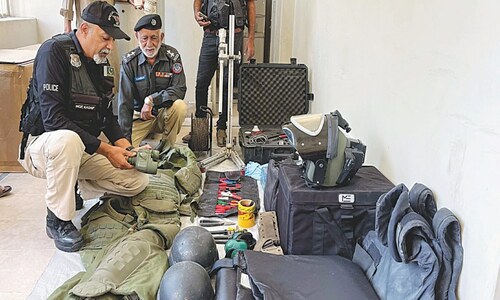KARACHI: The mechanisms leading to violations of human rights were studied closely with the aim of bringing the state and civil society on the same page during a workshop organised by the National Commission for Human Rights (NCHR) at a hotel here on Wednesday.
“Access to justice does not mean access to the courts. ‘Access to justice’ is a broad term,” said chairperson of the Sindh Human Rights Commission retired Justice Majida Rizvi. “Before going to the courts, an individual needs lots of other things such as advice, police intervention and legal assistance and information and economic conditions remains at the basis of all this,” she added.
“The educated affluent have access to all instruments of justice but the poor aren’t so lucky. Some are in such a bad state that they don’t even know of their rights. They certainly have no information or idea about how to go about fighting for their rights. This is also why the jirga and panchayat are flourishing,” said Justice Rizvi.
“So poverty and lack of information is our biggest problem here. And where people don’t even have ordinary information, what of legal information in a county where we are so behind in education? Even the police here don’t have legal knowledge. Not knowing basic law, all they do is wait for orders from above. What use are treaties, tribunals and courts for the economically backward and uneducated?”
Highlighting the problems faced in reporting and documenting cases of violence, Asad Iqbal Butt, vice chairperson of the Human Rights Commission of Pakistan, said that people when reporting such crimes of injustice faced pressure from all quarters such as religious pressure, family pressure, pressure from feudal lords, etc. “The feudal system, in fact, thrives on violations of human rights as they follow their own mindset about women’s rights, children’s rights, labour rights, etc. And they won’t bend,” he said.
“Children become the most oppressed and vulnerable as they don’t know their rights and they don’t even have the confidence to speak up for their rights. Then think about such a child who was wronged and never got justice, and who grows up believing that how he was treated was fine and acceptable and he can treat others that way.
“The same is the case with women. After marrying a girl off, her parents and siblings offer no support to her saying that she is responsible for herself and whatever she and her husband do is their business. So she suffers in silence. Spending so much time wondering what to do, what not to do, people end up losing valuable time and evidence. This is how the guilty get away with things,” said Mr Butt.
Law Secretary Aslam Shaikh spoke about the government’s human rights policy. “The Directorate of Human Rights has a complaint cell and offers free legal aid, too, but unless anyone complains how will the government’s mechanisms come into action,” he said.
Throwing light on the Pakistan Protection Act and human rights violations such as enforced disappearances, custodial violence in the light of it, Barrister Zamir Ghumro said it was the people’s right to speak up about something which they might not agree to but this act prevented them from doing so. “As your right of freedom of speech you can even oppose the Constitution of Pakistan,” he said. “But our government sees this as a threat to the state. People who air their opinion are practising their freedom of speech but if what they are saying doesn’t go well with the government’s agenda, they become anti-state elements. Acts such as the Pakistan Protection Act don’t save countries, people do,” he said.
Retired Justice Nasir Aslam Zahid said that there was a lot, which could be done in our prisons to improve the situation of prisoners and tell them about their rights. “Prisoner committees should be headed by retired judges as they happen to have better access to high officials within the government who listen to them out of respect,” he said, adding that judges enjoyed a lot of facilities after retiring, including a very handsome pension of half a million rupees. “They should not be allowed to sit idle when enjoying so many luxuries,” he said.
Justice Zahid also suggested a helpline number like ambulance services have here for people to call on to complain about any problem that they may be facing.
Earlier, introducing the NCHR, human rights activist Anis Haroon explained its set-up and function. “The National Commission of Human Rights was formed one year ago in May 2015. It has one member from each province and one representing the minorities,” said Ms Haroon, who happens to be its member from Sindh before going on to discuss the NCHR’s mandate and achievements so far. She said parliament representatives remained directly involved in addressing violations of human rights through the commission.
Identifying the disconnections and limitations of the existing mechanisms, which are inadequate and coupled with bureaucratic hurdles causing constraints, consultant Iqbal Detho provided an overview of international instruments of human rights. He said human rights could be safeguarded by empowering and giving protection to the people.
Published in Dawn, May 19th, 2016














































Dear visitor, the comments section is undergoing an overhaul and will return soon.